Description
Developing Therapeutics for Alzheimer's Disease
Progress and Challenges
Coordinator: Wolfe Michael S.
Language: English
Subject for Developing Therapeutics for Alzheimer's Disease:
Keywords
β-secretase; γ-secretase modulator (GSM); 5-HT6 antagonist; Aβ; active-site directed inhibitors; aggregation; Alzheimer; Alzheimer's disease; Alzheimer's disease (AD); amyloid; amyloid β; amyloid β peptide (Aβ); amyloid β precursor protein (APP); amyloid β-peptide; amyloid β-protein; amyloid beta; amyloid PET; amyloid precursor protein; amyloid-β; amyloid-related imaging abnormalities (ARIA); apolipoprotein E; assembly; ATP-binding cassette transporter; autophagy; autophagy adaptors; axonal transport; BACE1; biomarker; biomarkers; blood-brain barrier; brain training; cerebral amyloid angiopathy; chaperones; cholinesterase inhibitor; clinical candidates; clinical trial; clinical trials; clinical trials methods; clusterin; cognitive activity; cognitive aging; cognitive enhancement; CSF; cytotoxicity; dementia; donepezil; drug development; drug discovery; early-onset familial AD (EOFAD); emerging therapy; ephrin; epitope spreading; epothilone D; etiology; European Medicines Agency; exercise; FDG PET; fibrillization; Food and Drug Administration; gamma-secretase; genetic factors; genetics; genome-wide association studies (GWAS); heat-shock proteins; immunization; immunotherapy; late-onset AD (LOAD); LMTX; low-density lipoprotein receptor; low-density lipoprotein receptor-related protein 1; lysosome; memantine; metabotropic glutamate receptor; methylthioninium; microglia; microtubule; microtubule stabilizing agent; mild cognitive impairment; mitochondrial bioenergetics and dynamics; molecular mechanisms; monoclonal antibodies; multimodal; neurobiology; neurodegeneration; neuroprotection; neurotrophin; nicotinic acetylcholine receptor 7; nicotinic agonist; nonselective GSI; notch; notch-sparing; oligomer; oxidative stress; p75NTR; passive immunization; pathogenesis; pathology; phosphatases; phosphatidylinositol-binding clathrin assembly protein; phosphorylation
676 p. · 19x23.3 cm · Hardback
Description
/li>Contents
/li>Readership
/li>Biography
/li>Comment
/li>
Developing Therapeutics for Alzheimer's Disease: Progress and Challenges provides a thorough overview of the latest advances toward the development of therapeutics for Alzheimer?s disease, along with the major hurdles that still must be overcome and potential solutions to these problems. Despite the lack of progress toward developing therapeutics that can slow or stop the progression of this disease, important discoveries have been made and many promising approaches are advancing in preclinical studies and clinical trials. This book outlines the special challenges related to specific targets and approaches, while presenting a realistic, comprehensive and balanced view of drug discovery and development in this area.
Written by international leaders in the field, the book assesses prospects for the emergence of effective agents and allows readers to better understand the challenges, failures, and future potential for research in Alzheimer?s disease. This book is a valuable resource to academic scientists carrying out translational research in Alzheimer?s disease, industrial scientists engaged in Alzheimer's drug discovery, executives in biopharmaceutical companies making strategic decisions regarding the direction of internal research and potential outside partnerships, and graduate-level students pursuing courses on Alzheimer's therapeutics.
2. The Genetic Basis of Alzheimer's Disease
3. B-Secretase Inhibition
4. Y-Secretase Inhibitors: from Chemical Probes to Drug Development
5. Therapeutic Targeting of AB42
6. Modulators of Amyloid B-Protein (AB) Self-Assembly
7. Anti-Amyloid-B Immunotherapy for Alzheimer’s Disease
8. Targeting AB Receptors to Modify Alzheimer’s Disease Progression
9. Blood-Brain Barrier Transport of Alzheimer’s Amyloid B-Peptide
10. Alzheimer’s Disease Therapeutics Targeting Apolipoprotein E
11. Microtubule Stabilization
12. Tau Phosphorylation as a Therapeutic Target in Alzheimer's Disease
13. Stimulation of Tau Degradation
14. Passive Immunotherapy for Tau Pathology
15. Inhibition of Tau Aggregation as a Basis for Treatment and Prevention of Alzheimer’s Disease
16. Neuroprotective Strategies for Alzheimer’s Disease Prevention and Therapy
17. Symptomatic Cognitive Enhancing Agents
18. Tackling Alzheimer's Disease by Targeting Oxidative Stress and Mitochondria
19. Preclinical and Clinical Issues in Alzheimer Drug Development
20. Molecular Imaging in Alzheimer Clinical Trials
21. Fluid Biomarkers and Diagnostics
22. Non-Pharmacologic Activity Interventions to Prevent Alzheimer’s Disease
23. Prospects and Challenges for Alzheimer Therapeutics
- Provides a realistic but promising assessment of the potential of various therapeutic approaches to Alzheimer’s disease
- Focuses primarily on neuroprotective agents and cognitive enhancers, as well as approaches to targeting the amyloid B-peptide, tau and Apolipoprotein E
- Discusses alternative approaches, preclinical and clinical development issues, related biomarkers and diagnostics, and prevention and nonpharmacological approaches




